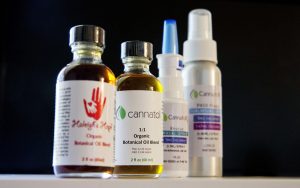 Earlier this year, we wrote that GW Pharmaceuticals was poised to receive the first approval from the U.S. Food and Drug Administration (FDA) for a drug derived from the cannabis plant — Epidiolex (cannabidiol, also known as CBD), a treatment for seizures related to Lennox-Gastaut syndrome and Dravet syndrome, rare forms of epilepsy. The FDA did indeed approve Epidiolex in June. However, the company was forced to delay its launch until the U.S. Drug Enforcement Agency (DEA) decided how to handle the approval. The company is now gearing up for a market launch for Epidiolex at the end of 2018.
Earlier this year, we wrote that GW Pharmaceuticals was poised to receive the first approval from the U.S. Food and Drug Administration (FDA) for a drug derived from the cannabis plant — Epidiolex (cannabidiol, also known as CBD), a treatment for seizures related to Lennox-Gastaut syndrome and Dravet syndrome, rare forms of epilepsy. The FDA did indeed approve Epidiolex in June. However, the company was forced to delay its launch until the U.S. Drug Enforcement Agency (DEA) decided how to handle the approval. The company is now gearing up for a market launch for Epidiolex at the end of 2018.
The issue: the DEA has historically classified cannabis/marijuana, including substances derived from the plant, as Schedule I drugs that are dangerous, have no medical benefit, and have a high potential for abuse. Other Schedule I substances include heroin and cocaine. But CBD has no psychoactive properties, unlike another cannabis-derived chemical, THC, which is responsible for the “high” associated with marijuana use. To address FDA’s approval of Epidiolex as a drug whose benefit was now proven, the DEA has rescheduled it to Schedule V, a class considered to have a demonstrated medical benefit and the least potential for abuse. This class also includes the cough syrup Robitussin AC and Pfizer’s Lyrica (pregabalin).
However, the DEA stopped short of reclassifying all CBD products. Beyond Epidiolex, experts believe the DEA is unlikely to change the status of CBD or other cannabis products unless the U.S. Congress directs them to do so (or, presumably, new CBD products achieve FDA approval and individually apply to DEA for reclassification), and Congress is unlikely to act on this issue.
Meanwhile, 47 U.S. states have now legalized CBD to some degree. The regulation of such products, their labeling, and their quality testing for purity and consistency, varies greatly from state to state. CBD-containing oils, lotions, and cosmetics are becoming popular, but remain Schedule I drugs and thus illegal under U.S. federal law. Some of the claims being made for such products — such as for cancer treatment — are unsupported and potentially dangerous, and of considerable concern to the FDA. With the exception of Epidiolex, the regulatory and legal situation for CBD-containing products in states where they are legal (either for medical or recreational use, depending on the state) remains confusing. California, where recreational marijuana use is legal, has proposed to support the FDA’s position of banning use of CBD in foods and dietary supplements, raising concerns from the state’s hemp industry.
GW Pharmaceuticals is continuing to develop Epidiolex for other uses and has begun a Phase 2 study of the drug as a potential treatment for seizures in tuberous sclerosis complex. The company believes Epidiolex may also have uses in autism spectrum disorders and Rett Syndrome, a genetically based neurological disorder. Moreover, interest from industry in the health value of CBD is growing. Coca-Cola has said that it is closely watching the growth of non-psychoactive CBD as an ingredient in functional wellness beverages worldwide.